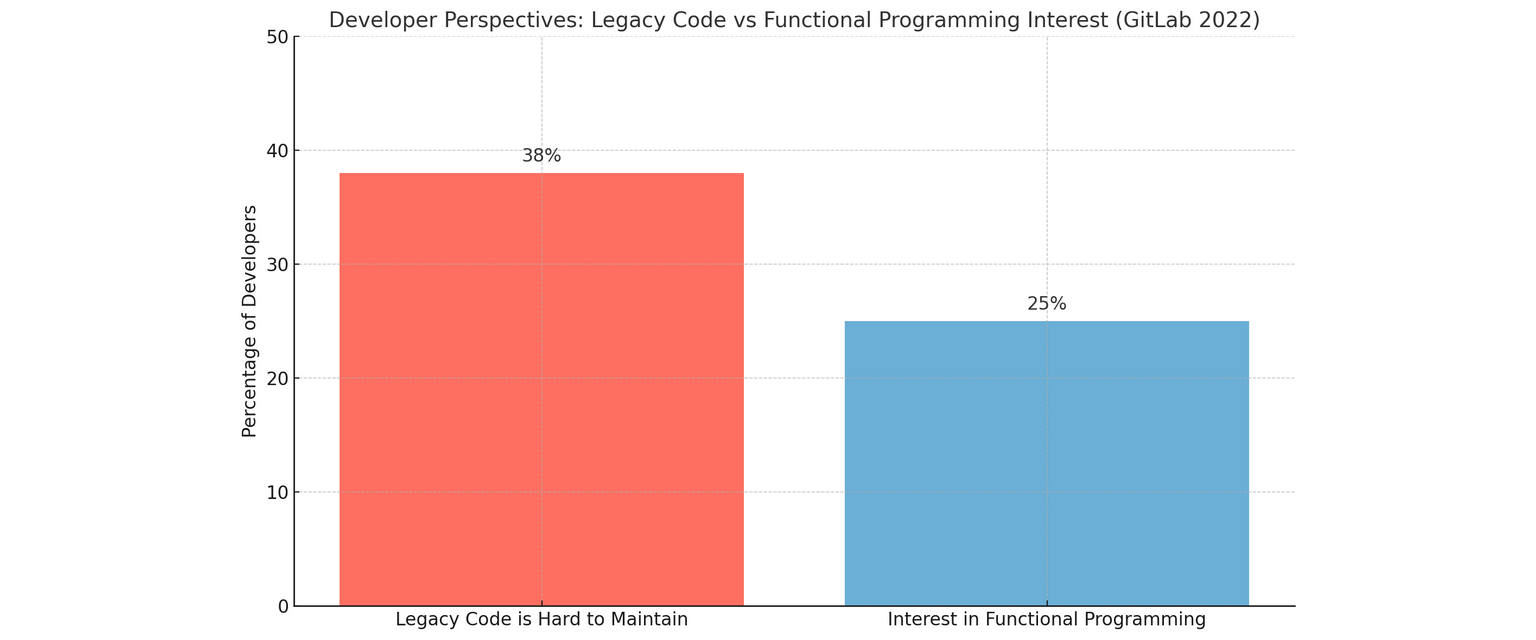Building Functional .NET Applications: a Guide for Choosing between F# vs C#
Imperative programming (also known as the inherent imperative paradigm) has a tendency to change data and state as the program runs, which makes it hard to analyze, test, and debug, especially in large codebases.
In GitLab’s 2022 survey, nearly 38% of developers said that debugging and maintaining legacy code is hard, most of which is written in imperative languages like C and Java. This reflects a growing interest in functional programming, which promises fewer bugs, smaller code, and easier-to-maintain solutions.

A functional programming approach has appeared to solve this limitation by making code more predictable and easier to manage: it attempts not to change things in place and focuses on using simple, reusable functions with no side effects.
Choosing the right programming language plays a major role in building functional .NET applications because it directly impacts how easily team members use functional programming principles.
While .NET traditionally focuses on object-oriented programming, selecting functional programming languages or features within the .NET ecosystem helps ensure cleaner and scalable code.
Normally, there are two options: C# and F#. Both languages allow software developers to take advantage of functional programming benefits, but they bear some critical differences that may impact the outcomes of the project.
Understanding Functional Programming
In fact, in the StackOverflow Developer Survey 2023, over 25% of developers say they use functional programming concepts on a regular basis.
At its heart, functional programming is inspired by existing programming languages like Haskell, Lisp, and Python. It’s less about applying functions and more about operating on functions. Functional programming lies on three principles:
- Immutability: Once you create immutable data, it doesn’t change. This prevents bugs and simplifies reasoning.
- First-Class and Higher-Order Functions: You can pass anonymous functions or even return them, making your code more flexible and modular.
- Pipeline Operator & Fluent Interfaces: These make function chaining (similar to using method chains) cleaner and more readable.
On the other hand, imperative programming is actually more about specifying steps to change the program’s behavior. It may be easier in some tasks, but typically makes the code harder to understand and more likely to have bugs because of changing states and side effects.

Overview of the F# Programming Language
F# is a .NET language specifically tailored for functional programming, but also able to accommodate object-oriented and procedural programming when the situation calls for it. It is a straightforward, easy-to-read syntax and is especially well-equipped to handle different data types.
Where F# Is Commonly Used:
- Data science and analysis: Especially in industries like finance and retail (used by Walmart and Huddle), F# helps process data effectively.
- Financial modeling: F#’s strong emphasis on immutable types and math-heavy operations suits modeling and forecasting tasks.
- Cloud services & complex applications: Thanks to features like higher-order functions and asynchronous workflows, it supports parallel processing, making it suitable for real-time applications and services.
Advantages of Using the F# Functional Language
F# is a great pick if you’re diving into .NET application development services. It’s built with functional programming at its core, which means everything about it, from its syntax to its features, is designed to make functional coding easier and more natural.
One of the more striking features of F# is its encouragement of immutability. It is designed to write code in a manner where data is not changed, making things predictable and resulting in fewer bugs.
F# is more expressive and has a more compact syntax than most programming languages, so you can do more with less code. Another advantage is its type inference system. F# is capable of inferring types on its own, which means you don’t have to write them down in your code.
F# is also loaded with higher-end features that make functional programming even more powerful. For example, you can use higher-order functions that enable you to pass functions around as if they were data.
When it comes to working with other .NET technologies, F# plays nicely with them. You can use F# alongside C# and other .NET languages, which means you can tap into the vast .NET library ecosystem while still enjoying F#’s functional strengths.

Overview of C#
According to Statista, C# takes the 8th place among the most used programming languages worldwide.
C# is a multi-paradigm programming language by Microsoft that enables you to use different programming styles, including object-oriented, imperative, and functional. It is one of the most in-demand languages in the .NET framework because it has many useful features and is suitable for any kind of project.
Advantages of Using C#
C# is a versatile and powerful language that shines within the .NET ecosystem. One of its greatest strengths is that it is able to fit different programming paradigms. This way, you can utilize the best approach for your program, be it an intricate system or a simple app.
The language is rich in features, such as lambda expressions and LINQ (Language Integrated Query), which allow you to write clean code.
Besides, C# is .NET-compatible, which means developers have direct access to the extensive library of tools and frameworks. With this compatibility, it is simple to create apps for any type of platform.
C# is also highly versatile. It works well with JavaScript, Python, and other hybrid languages, allowing developers to build traditional applications and modern cloud services alike.
Lastly, C# has a strong type system that prevents errors, thus making code more stable and easier to maintain. And with .NET Core and the later versions of .NET, C# can now be used for cross-platform development on macOS and Linux alongside Windows.
Typical Use Cases for C#:
- Web Development: C# and ASP.NET provide powerful tools and frameworks to help you make responsive, expandable, and protected web applications.
- Desktop Applications: C# is generally used with Windows desktop programming, together with technologies like Windows Forms and Windows Presentation Foundation (WPF).
- Mobile Apps: C# can be used to develop cross-platform mobile apps and release them on Android and iOS through Xamarin.
Comparing F# and C# for Functional Programming
To understand the debate between F# vs C#, it’s important to know their strengths regarding functional programming.
F# is specifically created for functional programming and hence supports things like pattern matching and immutability out-of-the-box.
C#, on the other hand, is not purely functional. It’s a multi-paradigm language that accommodates functional programming, among others. Though C# includes useful functional elements like lambda expressions and LINQ, it’s primarily famous for object-oriented language capabilities.
This is what makes C# a versatile option if you want to mix functional programming with other styles.
All in all, while both also have functional capabilities, F# makes it easier to stay within the functional model from the start. C#, on the other hand, is ideal if your project needs flexibility to combine object-oriented, imperative, and functional code.

Conclusion: What Language to Take for Building Functional .NET Applications?
In theory, the choice between F# and C# is significant because each language provides different approaches to functional programming.
Practically, the decision often comes down to the requirements of the project, as well as organizational preferences rather than technical constraints.
Both F# and C# support functional programming to varying degrees—F# as a functional-first language and C# as a multi-paradigm language.
Since both run on the .NET platform, they share a lot of the same tools and libraries, giving you plenty of development options.
Whether you’re leaning towards F# or C# development services, or just exploring your options, SCAND is here to help. Our team of experts is ready to deliver .NET applications that fit your needs.
If needed, our C# development outsourcing team can also support your project.












